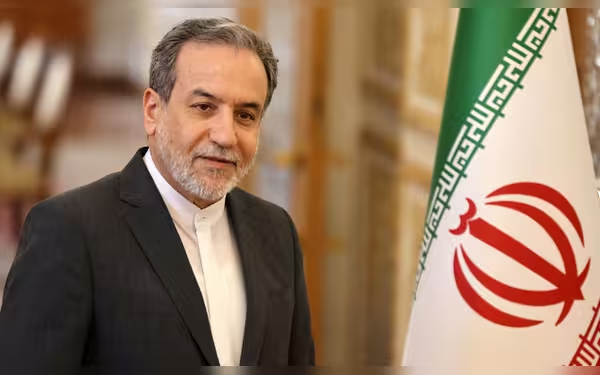Saturday, November 16, 2024 05:53 PM
Iran Dismisses Western Sanctions Over Missile Allegations
- Iran's Foreign Minister calls sanctions a 'failed tool'.
- Britain warns of 'significant response' to missile supplies.
- Iran emphasizes need for mutual respect in negotiations.
 Image Credits: arabnewspk
Image Credits: arabnewspkIran's Foreign Minister dismisses Western sanctions as ineffective amid missile supply allegations to Russia.
In recent developments, Iranian Foreign Minister Abbas Araghchi has publicly dismissed the effectiveness of Western sanctions imposed on Iran over allegations of arms exports to Russia. These sanctions were announced by Britain, France, and Germany, who accused Tehran of supplying ballistic missiles to Russia for use in the ongoing conflict in Ukraine. This situation highlights the ongoing tensions between Iran and Western nations, particularly in the context of Iran's nuclear activities and its geopolitical alliances.
Araghchi characterized the sanctions as a "failed tool" that Western countries have used in an attempt to influence Iran's policies. He expressed surprise that these nations have not yet recognized the ineffectiveness of sanctions, stating, "It’s surprising that Western countries still do not know that sanctions are a failed tool and that they are unable to impose their agenda on Iran through sanctions." This statement reflects Iran's long-standing position that sanctions are not a viable means of achieving diplomatic goals.
Furthermore, the Iranian Foreign Minister emphasized that sanctions serve as "a tool of pressure and a tool of confrontation, not a tool of cooperation." He reiterated Iran's openness to negotiations and constructive dialogue, but insisted that such discussions must be based on mutual respect rather than threats and pressure. This sentiment underscores Iran's desire for a more balanced approach in its international relations.
In response to the sanctions, Britain summoned Iran’s envoy in London, warning that the Iranian government would face a "significant response" if it continued to supply missiles to Russia. The United States has also intensified its sanctions against Iran, targeting Iran Air for its operations in the Russian transportation sector. This escalation of sanctions is part of a broader strategy by Western nations to curb Iran's influence and military capabilities.
On the diplomatic front, Iran's foreign ministry took action by summoning four European ambassadors to express its protest against the sanctions. This move indicates Iran's commitment to defending its interests on the international stage, despite the mounting pressure from Western powers.
For years, Iran has endured crippling sanctions, particularly after the United States unilaterally withdrew from a landmark nuclear deal in 2018. The ongoing sanctions have had a profound impact on Iran's economy and its ability to engage with the global community. As the situation continues to evolve, it remains to be seen how both Iran and Western nations will navigate this complex landscape of diplomacy and sanctions.
The current standoff between Iran and Western nations over sanctions and arms exports to Russia illustrates the intricate web of international relations. As both sides remain entrenched in their positions, the potential for dialogue and cooperation seems distant. However, the importance of mutual respect and understanding cannot be overstated, as these elements are crucial for any meaningful resolution to the ongoing tensions.













